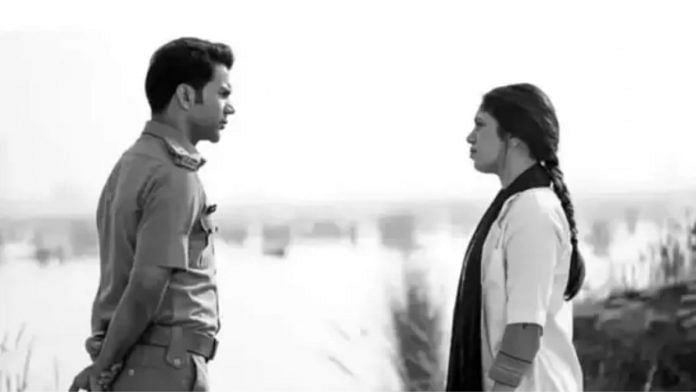Anubhav Sinha’s Bheed remembers one of the worst moments in Indian history—the migrant exodus. A sensitive, poignant and emotional reminder of the crisis, the film almost hits the nail on the head. But instances such as the removal of Prime Minister Narendra Modi’s 2020 lockdown speech from the movie and its trailer, and comparisons with the 1947 Partition, take away from its overall impact.
“It is not a story. It is an epic, and it is unwritten,” says Rajkummar Rao’s character Surya in the movie. Well, Sinha has made sure that’s not the case anymore.
Bheed uses ‘absences’ to make powerful statements. For instance, no politicians get screen time. It shows that those making decisions and policies for migrants are completely oblivious and apathetic to the crisis. “There are no arrangements for the poor,” says Surya, pointing to the government’s failure in managing the exodus.
Set in 2020, the film opens at a check post near Tejpur (possibly in Uttar Pradesh), where all migrant workers converge in a bid to get to their village, But tensions start to brew when the govt suddenly bans any and all movement, Bheed then merges themes such as caste, class, religion, science, fear and misinformation to get to the bottom of a crisis that still haunts Indian memory.
Also read: Maharani 2 sees Rani Bharti go from political pawn to queen bee. Watch it for Huma Qureshi
A moving portrait of migrants, essential workers
Bheed does a great job representing India’s frontline workers—and their experiences—during the Covid-19 pandemic through its various characters. Rajkumar Rao as UP cop Surya Kumar Singh, Bhumi Pednekar as Dr Renu Sharma, and Kritika Kamra as journalist Vidhi Prabhakar all form the brigade of essential workers following their duty.
On the other hand, we see a well-to-do lot: Balram Trivedi, a Brahmin security guard played by Pankaj Tripathi; Dia Mirza, who plays a rich yet distressed mother trying to evacuate her daughter from her hostel in a chauffeured car. She constantly uses an “us vs them” language to emphasise her privilege. The dialogues – by Sinha, Saumya Tiwari and Sonali Jain—are the film’s highlight, as they make an impact where visuals can’t.
While the ensemble cast delivers solid performances, Rao, Pednekar and Tripathi stand out. “There are borders inside our country now?” asks Balram Trivedi earnestly. Despite being deeply casteist, he is also shown as a scared, vulnerable man hell-bent on getting his family, and even others, on a bus home.
Bheed gives flashbacks from Article 15. The upper caste protagonist of the former is replaced by Rao’s character, a Dalit police officer who cries out in anguish to his superior, “I want to become a hero too.”
Also read: You keep hoping Vijay Deverakonda’s ‘Liger’ will get better. It never does
Creating a powerful montage
The film combines montages of distressing events widely publicised and broadcast during the crisis—such as 16 migrants crushed to death by a train in Allahabad, Tablighi Jamaat Covid hotspot—to make an emotional impact. It captures the constant unease people felt during that time, an unease extending beyond the virus itself. For instance, at a checkpoint, everyone listens to the Tablighi Jamaat Covid hotspot news, after which a bus refuses to take care packets offered by another bus filled with Muslims. Caste slurs are thrown around casually, until the issue scarily bubbles over.
The choice to shoot in black-and-white pays off as the audience is left to imagine the shades of trauma and pain the labourers underwent. It adds a degree of ominousness that forces one to introspect. Even comedic moments are laced with tension, almost making one feel guilty for laughing.
However, the film does lapse here and there. For instance, the camaraderie between the Dalit Surya and the Brahmin Balram, while evident, is surface level at best.
Bheed will force you to recall India’s lockdown migrant exodus—something you’d rather forget. It is undoubtedly a rare commercial film that stands its ground in depicting caste divisions in all its horror and trauma. It also emerges as a portrait of hope, no matter how temporary and tenacious it seems—and that is both Bheed and Sinha’s triumph.



